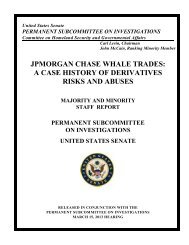JPMORGAN CHASE WHALE TRADES: A CASE HISTORY OF DERIVATIVES RISKS AND ABUSES
JPMORGAN CHASE WHALE TRADES: A CASE HISTORY OF DERIVATIVES RISKS AND ABUSES
JPMORGAN CHASE WHALE TRADES: A CASE HISTORY OF DERIVATIVES RISKS AND ABUSES
Create successful ePaper yourself
Turn your PDF publications into a flip-book with our unique Google optimized e-Paper software.
240<br />
CIO aggregate stress is over 23% of its $15B [billion] limit. Also MtM [mark-tomarket]<br />
cs bpv limit is in excession by 1074% and has been in excession for 71<br />
days.[’]” 1358<br />
The CIO’s Chief Market Risk Officer, Peter Weiland, responded by email to the OCC’s<br />
inquiry, downplaying the significance of the breaches. First, Mr. Weiland wrote that the VaR<br />
breach was not related to new CIO trading activity, but to “market data,” essentially attributing<br />
the breach to older SCP trades, even though those older trades were very risky and would<br />
1359<br />
continue to generate losses.<br />
Secondly, Mr. Weiland explained that the CIO had ended the stress breach by raising its<br />
aggregate stress limit, so that the trades aggregating $12.67 billion were actually under rather<br />
that over its new $15 billion limit. He acknowledged, however, that the CIO’s $1 billion MTM<br />
(mark-to-market) stress limit (i.e., the stress limit that covered the SCP) was still in breach at<br />
1360<br />
$1.53 billion, but provided no explanation as to the reason for the breach or how the bank<br />
planned to get back under the limit. When asked why the OCC did not pursue the stress breach<br />
at the time, an OCC examiner told the Subcommittee that he had assumed that Ms. Drew would<br />
have had to sign off on the breach of the MTM stress limit, which would have engendered a<br />
discussion about it within the bank. 1361<br />
Basically, he indicated that as long as the CIO knew<br />
about the breach, the OCC had trusted the CIO to take appropriate steps to deal with it, and did<br />
not view the OCC as having an obligation to verify that the CIO’s risk management was actually<br />
doing its job.<br />
Lastly, in response to the CSBPV breach of 1074% over 71 days, Mr. Weiland told the<br />
OCC: “We are working on a new set of limits for synthetic credit and the current CS01 will be<br />
1362<br />
replaced by something more sensible and granular.” He, again, downplayed the importance<br />
of the CSBPV breaches by promising a more “sensible” replacement limit in the near future.<br />
OCC examiners told the Subcommittee that they later realized the CSBPV breach was “a huge<br />
red flag,” 1363 and “egregious,” 1364<br />
but acknowledged that, at the time, the OCC reacted by<br />
tolerating that and the other ongoing breaches, accepting the bank’s reassurance regarding their<br />
insignificance, and failing to press the bank to identify and remedy the underlying risks.<br />
So, by late April 2012, the bank had provided the OCC with repeated assurances that the<br />
SCP functioned as a hedge designed to lower bank risk, supplied one “useless” chart and another<br />
less-than-complete briefing detailing the trades, and offered multiple excuses for the CIO’s<br />
1358<br />
4/19/2012 email from James Hohl, OCC, to Peter Weiland, CIO, “Info on VaR, CSBPV, and stress status and<br />
limits,” OCC-SPI-00022340.<br />
1359<br />
Mr. Weiland explained that the increase in firm VaR “was not due to any new trades, but rather to market data.”<br />
4/19/2012 email from Peter Weiland, CIO, to James Hohl, OCC, Info on VaR, CSBPV, and stress status and limits,<br />
OCC-SPI-00022340.<br />
1360<br />
4/19/2012 email from Peter Weiland, CIO, to James Hohl, OCC, Info on VaR, CSBPV, and stress status and<br />
limits, OCC-SPI-00022340.<br />
1361<br />
Subcommittee interview of James Hohl, OCC (9/6/2012).<br />
1362<br />
4/19/2012 email from Peter Weiland, CIO, to James Hohl, OCC, “Info on VaR, CSBPV, and stress status and<br />
limits,” OCC-SPI-00022340 (stated by Peter Weiland).<br />
1363<br />
Subcommittee interview of Jairam Kamath, OCC (8/24/2012).<br />
1364<br />
Subcommittee interview of Elwyn Wong, OCC (8/20/2012); see also Subcommittee interview of Fred Crumlish,<br />
OCC (8/28/2012) (describing the breaches as a big problem that should have been pursued.).



